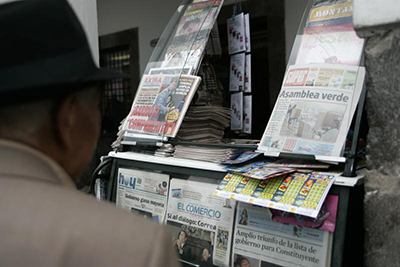Attempts to amend Ecuador’s constitution to categorize communications as a “public service” has sparked a fierce debate, with one critic drawing comparisons to the way dictators such as Stalin and Hitler used the press as a propaganda tool, and supporters of President Rafael Correa’s government arguing that the proposed reforms will make journalism more accountable and accessible.
Government officials insist that the proposed amendment will democratize the media, which they claim is dominated by private interests too powerful to be self-regulated. Opponents claim that free expression would no longer be a fundamental right and would instead become a public service, opening the door for the government to exercise broad regulatory powers over all media outlets.
“A public service is one in which the state, more or less, oversees that service. That’s fine for water, electricity, health and education. But we are not talking about that. We are talking about freedom of expression,” Edison Lanza, special rapporteur for freedom of expression for the Organization of American States (OAS), said last month at a conference on press freedom in Ecuador’s capital, Quito. “This is an erroneous vision.”
Communications is already qualified as a public service under Ecuador’s 2013 Communications Law. But media analysts told the Committee to Protect Journalists that later this year the National Assembly, which is dominated by Correa loyalists, will likely approve an amendment that would include this definition in the constitution.
The amendment would give the public service concept more prominence and legitimacy as part of the highest law of the land, said Patricio Barriga, president of the Council for the Regulation and Development of Information and Communication (CORDICOM), a state regulatory body that first proposed the constitutional change.
In a telephone interview with CPJ, Barriga denied that it would lead to wider state control over news content or require newspapers to seek a government concession–as in the case of other public services–to publish. Rather, Barriga said, the aim was to improve the overall quality of the media, making the news more accessible and bringing Ecuadorans of all walks of life into the process of gathering and disseminating the news.
Barriga said it was unfair that just a fraction of Ecuadoran newsrooms were made up of journalists of Indian or African descent and that only 39 percent of their employees were women. Indian groups, he added, should be able to receive reports in their native tongue and the hearing impaired should have access to the news in sign language. He suggested that low income people or communities could receive training and financial help from the government to open radio stations.
“This is how the state can intervene in a positive way to guarantee freedom of expression for everybody,” Barriga told CPJ. “This is not a fascist concept.”
But Marcelo Espinel, a lawyer for Quito-based press freedom group FUNDAMEDIOS, told CPJ that only dictatorial governments have sought to categorize communications as a public service with the aim of turning the media into state-run propaganda organs and crushing dissenting voices.
“Where did this exist?” Espinel said. “In Spain under Franco. In Nazi Germany. In Italy under Mussolini and the U.S.S.R. under Stalin.”
At the Quito conference Lanza, the OAS rapporteur, said no other government in Latin America, except for communist Cuba whose constitution states that the media must “conform to the goals of a socialist society,” considers communications a public service.
But Barriga said critics including the OAS and FUNDAMEDIOS habitually defended the rights of profit-driven media owners while ignoring the needs of average Ecuadorans. When asked if any other governments shared the Correa administration’s views on the public service issue, he said: “We are breaking new ground in defending the rights of the people.”
Santiago Guarderas, dean of the Catholic University of Ecuador law school in Quito, told the online magazine Plan V that, in theory, the amendment would mean that only the state could administer and manage communications and that all private media, including newspapers or online news outlets, would need concessions from the government. (Like elsewhere, Ecuadoran radio and TV stations already require government transmission licenses).
When it comes to fundamental rights, like free expression, Guarderas said governments have the obligation not to intervene.
Christian Zurita, an investigative reporter for the independent El Universo, one of the country’s largest daily newspapers, suspects the amendment will mean more state control because, through the Communications Law and other measures in the past eight years, the Correa government has sought to place more restrictions on the media. He said, for example, that CORDICOM approved a measure last year that will force El Universo and 60 other major Ecuadoran media outlets to employ an “audience ombudsman” to monitor the work of reporters and editors. The media outlets would have to provide office space and pay the salaries of these officials, whom Zurita fears could turn out to be pro-government bureaucrats
“It is all part of a strategy of control because the government believes that the news media is its No. 1 enemy,” Zurita told CPJ.
